past issues

|
Published monthly for CC employees by Clinical
Center Communications
January 2000
New CC Hospitality Services Program kicks off
Clinical Center scores high on patient survey
Longtime Clinical Pathology employee retires
Jolly holidays
The magic
touch of the interpreter
Send your
receipts
In memory
Teacher award
News briefs
|
|
New CC Hospitality Services Program kicks
off
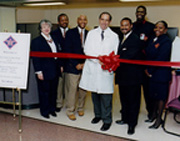 |
|
A hospitable hospital
A ribbon-cutting and reception held last month in the Center
Lobby marked the opening of the CC's new Hospitality Services
Program. Pictured from left to right are Sue LaRoche, Matthew
Corley, Michael Alexander, Dr. John Gallin, Michael Daniel, Edward
Pettway, and Nancy Pierre.
|
| From left to right, Sue LaRoche,
Michael Daniel, and Maureen Gormley applaud the opening of the
CC's new Hospitality Services Program. |
|
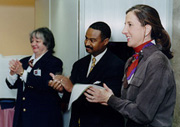 |
|
Think back to the first time you entered the Clinical Center.
Did you confidently find your way to your appointment or meeting?
Or did you wander the endless corridors until a kindly stranger
pointed you in the right direction?
Thanks to the CC's new Hospitality Services Program launched
last month, newcomers won't have to wander and wonder anymore;
they'll have easy access to specially trained hospitality staff
who will help them navigate this ever-changing building.
At the ribbon-cutting ceremony, CC Director John Gallin said,
"Today we celebrate the beginning of hospitality services
at the Clinical Center in a formal way. We've always been very
hospitable, but now we are formalizing it. This is the beginning
of teaching people to smile and to be generally helpful to everybody."
The program features a greeter stationed outside the CC's
front entrance to meet people as they arrive, and hospitality
service coordinators stationed at the South Lobby, Center Lobby
(near Masur Auditorium), and North Lobby, who will guide visitors
to their destinations or assist them with special needs.
Team members can be recognized by their navy-blue blazers,
with a hospitality services logo. Equipped with walkie-talkies,
they can quickly communicate to ensure that each guest receives
the needed services in a timely manner.
The hospitality services team includes Michael Daniel, program
chief; Michael Alexander, Matthew Corley, and Sue LaRoche, hospitality
services coordinators; Edward Pettway, greeter; and Nancy Pierre,
administrative assistant. All are veteran CC employees, except
Daniel and Pettway, who worked together in hospitality services
at the University of Maryland Medical System in Baltimore. Several
volunteers have been recruited to assist the full-time staff.
Thanks to two weeks of intensive customer service training,
team members were well prepared for their first day at their
new posts. "It was great to see them in action," said
Daniel. "They had the necessary tools to ensure their success."
The suggestion to implement such a program came from the CC's
Patient Advisory Group. "They told us we did a great job
with patient care, but the process of getting to the patient-care
units was sometimes cumbersome," said Daniel.
"When the South Lobby opened, the orientation of the
building radically changed," added Jan Weymouth, CC program
manager. "Although the signage was very well done, people
were still getting lost."
A steering committee was formed to investigate how the CC
might better address wayfinding issues. Michael Daniel was hired
last summer, and the program jelled rapidly, thanks to his experience
forming a similar program at the University of Maryland Medical
System.
As he accepted the many congratulations offered at the kickoff,
Daniel said, "I could not have done this without the hard
work of [the Steering Committee]. They've been extremely helpful
in guiding the process and providing the expertise and information
to make this venture a success." Committee members are Rona
Buchbinder, Sara Byars, Laura Cearnal, Dottie Cirelli, Michael
Daniel, Larry Eldridge, Adrienne Farrar, Maureen Gormley, Steve
Groban, Andrea Rander, Maggi Stakem, and Jan Weymouth.
At the ribbon-cutting, Maureen Gormley, the CC's chief operating
officer, said, "I'd like to recognize Jan Weymouth. She's
done all the administrative coordination behind this program,
including getting the furniture and electricity in place, and
juggling the logistics and staffing. This was no small feat."
Although staff and facilities are in place, the initiative
is not yet complete. "The next endeavor is the training
of all Clinical Center staff to orient them to the philosophy
of hospitality," said Weymouth.
Daniel will conduct a series of on-site seminars for CC staff.
"We'll spend a day in the classroom talking about various
customer-service subjects." Added Weymouth, "Our goal
is to have everyone who has any interaction with a patient or
visitor to have the opportunity to understand what hospitality
is all about."
Training sessions should begin in the next few months.
by Sue Kendall
Back to Top
|
|
Clinical Center scores high on patient
survey
Would you recommend the Clinical Center to your friends
and family?
"Yes," was the answer of 90 percent of patients
who responded to a recent survey conducted by the Clinical Center
and the Picker Institute, a nonprofit organization located in
Boston, Mass., that works with health care organizations to help
them implement improvements based on feedback from patient experiences.
The CC also received high marks in nursing care, involvement
of family and friends, and courtesy of staff.
Surveys were sent to 728 Clinical Center inpatients who were
discharged between January and March of 1999; nearly 62 percent
responded.
"That response rate was the best that Picker has ever
had," according to Laura Lee, special assistant to the deputy
director for clinical care and coordinator of the study.
The Picker Institute has a data base of about 450 hospitals,
including 180 academic medical centers, which are what the Clinical
Center is most comparable to.
Rather than a traditional patient satisfaction survey, this
survey grouped questions into eight "dimensions of care,"
identified by Picker:
- Respect for patient values, preferences, and expressed needs
- Access to care
- Emotional support
- Information and education
- Coordination of care
- Physical comfort
- Involvement of family and friends
- Continuity and transition.
"The dimensions of care measure what patients perceive
happened to them in the hospital, rather than whether they were
satisfied or not," explained Lee. "A drawback with
satisfaction surveys is that a patient could report satisfaction
with a process that in fact lacked a crucial step. Picker's research
has shown that when you ask questions about what happened during
a process, you get a better measure of clinical quality."
The CC scored above the average of the academic health centers
in all dimensions, and set the benchmark in physical comfort
and involvement of family and friends.
The survey also identified some areas for improvement, including
communication of medical information, coordination and continuity
of care, and room environment.
"Some respondents indicated that they were told conflicting
information by different people, or that tests weren't always
performed on time," explained Lee. "The Clinical Center
is a large and complex place, and we think that may be part of
the reason behind these answers. We plan to convene focus groups
of patients to see how we can improve in these important areas."
Several custom questions germane to the CC's unique mission
were included for which no benchmark data are available. The
CC plans to use internal benchmarking-comparing itself to itself
over time-by use of annual surveys and monitoring.
"In future surveys, a few of the custom questions may
need to be reworded or expanded to get more precise information,"
Lee said.
One custom question did receive a much-hoped-for answer, however.
Patients were asked, "When you agreed to participate in
the study you are on, what was the most important reason?"
One of the top three reasons cited was to benefit others. The
other two were to learn more about the disase and to get the
newest treatments.
"It is such a tribute to our patients that they really
do come here to benefit others," said Lee.
So why wasn't this survey done sooner? "Federal paperwork-reduction
regulations restrict government use of customer satisfaction
surveys, which is why the CC does not do them routinely,"
said Lee. She credits Dr. David Henderson, the CC's deputy director
for clinical care, for diligence in obtaining a waiver from the
Office of Management and Budget to do this survey.
The next steps are to continue to analyze the survey data,
assemble improvement teams, and target strategies for improvement.
Outpatient and pediatric surveys are also being planned.
"The results are this positive because of the wonderful
patients and terrific, dedicated, mission-driven staff the Clinical
Center has," said Lee. "The high response rate shows
that our patients are very interested in providing feedback-good
and bad-because of their partnership with us in the research
process."
by Sue Kendall
Back to Top
|
|
Longtime Clinical Pathology employee retires
Janice Glickman holds a piece of the Clinical Center's history.
The souvenir brick was presented to her at a retirement tea,
held last month.
|
|
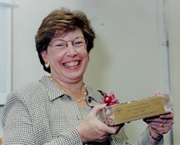
|
Janice Glickman looks back on 30 years
of change in laboratory technology
Janice Glickman, of the Clinical Pathology Department, retired
last month after 30 years of service to the Clinical Center.
Glickman joined ClinPath in 1963 after graduating from George
Washington University with a bachelor of science degree in medical
technology. She also earned a master's degree in administrative
sciences from Johns Hopkins University. Except for an 8-year
hiatus to raise her children, she worked in the clinical chemistry
service her entire career, and supervised the immunoassay section
of that service for the past 15 years.
Dr. Alan Remaley, Glickman's supervisor, pointed out that
she has been with ClinPath longer than any of the other current
employees.
"The Clinical Pathology department is grateful for her
long and dedicated service and she will be greatly missed,"
he said. "During her time at the NIH, she has witnessed
the modern transformation of the clinical laboratory by automation
and computers. When she started, the laboratory performed only
a limited number of tests by mostly laborious manual methods
and relied solely on the manual transcription and reporting of
test results. Today the laboratory performs over 100 automated
tests, and the results are reported to the patient units via
computers."
Laboratory technology has improved to the point where an assay
that used to take a day and a half to perform now takes about
12 minutes. These new methods and rapid turnaround times enable
Glickman's staff to provide test results during special procedures
or surgery, which helps the surgeons better localize the diseased
tissue and determine when they've gotten it all out of the patient.
"Not only is this great for the patient and surgeon,
but it's good for the techs as well," she said. "Since
we're right there in the OR suite, it gives us patient contact
that we don't usually get in the lab."
Although still enthusiastic about her work, Glickman felt
that the timing was right to retire.
"I've only done this particular job, so I want to try
something different; I hope to teach special education,"
she said. She has applied to Teachers 2000, a collaborative program
between Montgomery County Public Schools and George Washington
University leading to a master's degree in education. "I
enjoy problem solving and figuring out how to present information
to people with different needs."
Looking back on her years here, Glickman said, "I've
really enjoyed working with the other technologists in my section,
and I've learned a lot from them. The Clinical Center is a very
good place for a med tech to work. There are always exciting
new things going on in our department, and we have the cutting-edge
technology. It is very satisfying to know that you are giving
the patient the best they can get in that area of their health
care. I feel very fortunate to have worked here."
by Sue Kendall
Back to Top
|
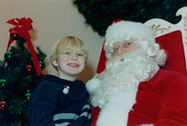 |
|
Jolly holidays
Santa Claus visited with children on the 14th floor shortly
before Christmas to double-check his shopping list. At left,
Jonathan Hackler, 10, asked for lots of Legos and toy cars.
|
|
At right, Alisa Townley, 3, seemed content with just a sugar
cookie, but she managed a request for a Curious George doll.
The Recreation Therapy Section of the Clinical Center's Rehabilitation
Medicine Department arranged for Santa's visit
Back to Top
|
|
 |
The magic touch of the interpreter
The following letter, written by a former Clinical Center
volunteer interpreter, was forwarded to CCNews by Andrea Rander,
chief of volunteer services.
Thanks to the great opportunity of working as a volunteer
medical interpreter at the National Institutes of Health, I experienced
the wonderful feeling of being an interpreter.
More than a translator, the interpreter is the facilitator;
is the one who makes understanding a lot easier, avoiding difficulties
among people of different ethnic backgrounds; is the one who
helps convey the right information, thus avoiding frustration,
and making life easier for people who speak different languages.
On occasion, in the medical field an interpreter can even
save the life of a person by indicating the right symptom and
interpreting the correct emergency medical care.
An interpreter can also become a guide to the newcomer by
indicating the right steps to follow when applying for a loan,
buying a car, or even making an appointment with a
physician.
In a particular situation, it was very flattering for me to
hear from a a patient that by seeing me coming into her room,
it was as if a guardian angel came in, making her feel better
due to the breaking down of a barrier to communication.
I have experienced great satisfaction as an interpreter through
helping non-English speakers communicate with their care providers.
The interpreter is always ready to perform their job with enthusiasm,
dedication, and great efficiency.
Dolly M. Torrico
If you would like to volunteer as a Clinical Center interpreter,
contact Andrea Rander at 6-1807.
Back to Top
|
Send your receipts
The drive to collect grocery receipts to benefit local schools
is still on. If you aren't currently supporting a school, please
consider the NIH Children's School.
Receipts from Giant stores may be sent to Bldg. 10, Room 10S235.
Contact the NIH School at 6-2077 for information on the Safeway
program.
Back to Top
|
|
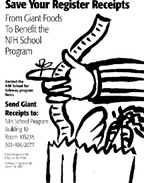 |
|
|
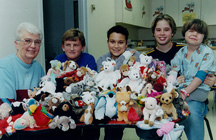
Back to Top
|
|
In memory
The family of the late Jacinta Shafor Cohen, a former CC patient,
visited the 14th floor playroom last month to donate 300 Beanie
Babies to CC pediatric patients in her honor. Described by family
as friendly, helpful, caring, creative, and artistic, Cohen collected
and distributed more then 600 Beanies to CC pediatric patients
during her 2 1/2 years as a CC patient. Cohen died last September
of melanoma. In lieu of flowers, the family asked for donations
to support melanoma research. The family donated $1000 to Dr.
Steven Rosenberg to support his research of this type of cancer.
Pictured from left to right are Cohen's mother, Rita Shafor;
Michael Hutchinson; Sam Whitmore; Maria Cohen, Cohen's daughter;
and Rosemarie Peak.
|
Teacher award
Dr. Susan Leitman, chief of the Blood Services Section of
the Clinical Center's Department of Transfusion Medicine, received
the 1999 Distinguished Clinical Teacher Award. The Clinical Teacher
Award is presented annually to recognize excellence in clinical
training involving the direct care of patients by any senior
clinical investigator at NIH. Clinical associates nominate individuals
who, in their judgment, have contributed significantly to the
professional development of clinical trainees. The final selection
is made by a panel of NIH fellows. Dr. Leitman's nominations
cited her energy, enthusiasm, patience, fairness, clinical teaching
skills, academic talent, dedication to patients, and mentoring
of fellows. Pictured with her is CC Director Dr. John Gallin.
Back to Top
|
|
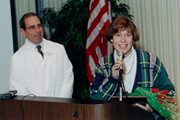 |
News briefs
Weight study
Parents, consider enrolling your overweight teen in an NICHD
study of a promising weight-loss medication called Orlistat.
NIH provides all study tests, medication, and weight-control
education at no charge. Overweight teens aged 1217 who can
attend weekly weight-control meetings may be eligible. Call the
Patient Recruitment and Public Liaison Office at 1-800-411-1222
for details.
Healthy mothers needed
NIMH researchers seek right-handed mothers aged 20 to 40 with
non-adopted, first-born children aged 5 to 12 to participate
in a fMRI study on the visual processing of faces. Volunteers
should have no history of medical or psychiatric disorders, and
should not be taking prescription medication (including birth
control pills). The first-born children of volunteers should
have no history of psychiatric illness or chronic medical problems.
Volunteers must have normal vision or wear contacts. Participation
requires a 2-hour screening interview, a follow-up visit, and
a 3-hour visit for the fMRI scan. Participants will be reimbursed.
For more information, call Lisa Kalik or Neil Santiago at 6-8381.
Brain study
NINDS researchers seek healthy volunteers for fMRI studies
of brain and cognitive function. Tasks may be as simple as moving
your fingers or as complex as remembering ideas and responding
by pressing buttons. A 1- to 2-hour screening interview and a
3- to 4-hour visit for the fMRI scan are typical. Volunteers
should have no implanted metal in their bodies, and should have
normal vision or wear contact lenses. Participants will be reimbursed.
Specifically needed are men and women aged 18 to 35 years, who
are right-handed and who learned English as their first language.
For more information, call Milan Makale at 6-0225.
Visual study
NIMH researchers seek men aged 56 to 73 and women aged 51
to 59, to participate in an fMRI study on the visual processing
of faces. Partici-pants must be right-handed and currently married.
Volunteers should have no history of medical or psychiatric disorders,
and should not be taking prescription medication (except hormone
replacement therapy for women). Volunteers must have normal vision
or wear contact lenses. Participation requires a 2-hour screening
interview, a follow-up visit, and a 3-hour visit for the fMRI
scan. Participants will be reimbursed. For more information,
call Lisa Kalik or Neil Santiago at 6-8381
Please revolve
As winter chills up, please remember to use the revolving
door at the Clinical Center's South Lobby rather than the two
side doors. Use of the revolving door will help keep the lobby
warm for staff and visitors and will conserve energy.
Finance class
The Education and Training Section of OHRM presents "Personal
Financial Management," on Feb. 3, from 8 a.m. to 12 noon.
Frederic Petze, personal financial manager, will present a basic
vocabulary of financial terms and principles, and discuss how
to develop a financial management plan. Call 6-1618 for more
information or to register.
Daniels is tops
Dr. Charles Daniels, chief of the CC's Pharmacy Department,
was named one of the 50 most influential pharmacists of 1999
by "American Druggist" magazine. According to the magazine's
profile, "in the last year alone, he has enhanced the review
process of medication errors, spearheaded new quality-of-life
research studies, and implemented a pharmacy credentialing program
to ensure that pharmacists at NIH are properly trained for the
often complicated research projects at the clinic. Daniels is
also hoping to increase the frequency of collaborative efforts
between pharmacists and physicians on the research teams."
The article is available at www.americandruggist.com
Sonies honored
Dr. Barbara C. Sonies, chief of the Speech-Language Pathology
Section of the CC's Rehabilitation Medicine Department, was honored
by the American Speech-Language Hearing Association (ASHA) at
its annual convention last November. The ASHA Honors recognize
those whose contributions to the field of speech, language, and
hearing "have been of such excellence that they have enhanced
or altered the course of the professions," according to
ASHA. It is the highest award the Association bestows. Sonies
was recognized for her research on the use of ultrasound to image
the oropharynx, and her clinical expertise in the management
of swallowing disorders.
New directive form
Consistent with the Federal Patient Self-Determination Act,
NIH policy requires that all Clinical Center research participants
be given information about advance directives and the opportunity
to fill out an advance directive if they wish. Starting Jan.
17, a new form, "NIH Advance Directive for Health Care and
Medical Research Participation," will replace the old form.
New forms are available at nursing stations and clinics, or from
the Department of Clinical Bioethics. Blank copies of the old
form should be destroyed. Completed copies of the old form will
continue to be valid.
Bioethics encourages NIH staff to alert all participants to
the new form, even those who have previously completed an advance
directive, because the new form allows individuals to indicate
preferences regarding their future research participation.
The Bioethics copy (green copy) of completed advance directives
should be sent to Bldg. 10, Room 1C118. Please ensure that all
information, including patients' names and identification numbers,
appears clearly on the 4 copies of completed forms.
For more information, contact Bioethics at 6-2429.
Back to Top
|
Clinical Center News, 6100 Executive
Blvd., Suite 3C01, MSC 7511, National Institutes of Health, Bethesda,
MD 20892-7511. Tel: 301-496-2563. Fax: 301-402-2984. Published
monthly for CC employees by the Office of Clinical Center Communications,
Colleen Henrichsen, chief. News, article ideas, calendar events,
letters, and photographs are welcome. Deadline for submissions
is the second Monday of each month.
top | cc
home page | nih home
page | |
|

